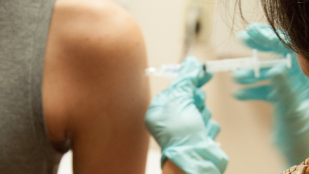 FLICKR, NIAIDA Phase 1 trial in China has demonstrated the safety of a new Ebola vaccine and hinted at its efficacy, according to a study published today (March 25) in The Lancet. The vaccine candidate is the first to incorporate immunogens from the strain of Ebola that has terrorized West Africa for nearly a year; all other tested Ebola vaccines have been based on the strain that caused an outbreak in Zaire in 1976, according to a press release.
FLICKR, NIAIDA Phase 1 trial in China has demonstrated the safety of a new Ebola vaccine and hinted at its efficacy, according to a study published today (March 25) in The Lancet. The vaccine candidate is the first to incorporate immunogens from the strain of Ebola that has terrorized West Africa for nearly a year; all other tested Ebola vaccines have been based on the strain that caused an outbreak in Zaire in 1976, according to a press release.
In the Phase 1 trial, investigators administered the new vaccine candidate, developed by the Beijing Institute of Biotechnology and Tianjin CanSino Biotechnology, or a placebo to 120 healthy Chinese adults. Four weeks later, all 40 participants who received a high dose of the vaccine showed a positive immune response, as did 38 out of 40 participants in the low-dose group. Those who had received the high dose produced more antibodies than those in the low-dose group. No serious adverse events were reported. The researchers plan to follow the vaccine recipients to assess long-term immune responses.
“This adenovirus type-5 Ebola vaccine vector is an example of how quickly existing vaccine platforms can be modified to incorporate a new virus strain, and moved, with minimum testing in ...





















